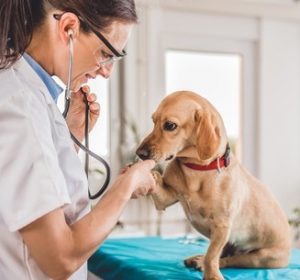
Find an excellent, caring, conscientious veterinarian for your senior dog and plan to book a visit twice a year – it’s the best schedule to follow for keeping on top of health issues that might arise more rapidly in an aging dog than in a younger dog. The earlier a health issue is detected, the easier it will be to treat and the better the outcome will be. Bloodwork that your veterinarian will do at these visits is essential to detecting health issues that are not apparent to the naked eye.
When you think about it, we humans attend to our health by having appointments with any number of physicians. We see a dentist, an opthalmologist, and an internist at a minimum and at least once a year and more often as we age. Our dogs generally see just one doctor — a veterinarian — who looks at all of the various systems and features of our dog’s body. Put that together with the rate of aging in dogs, and a twice-a-year visit for a senior dog begins to seem really important.
Be prepared for your visits with observations about your dog that concern you. If possible, do some online research to get some background about your concerns and to organize your questions.Be prepared for your visits with notes on any changes in your dog’s appearance or behavior that concern you.
The Senior Dogs Project always likes to continue a relationship with the veterinarians who have treated the dogs we’ve adopted through rescue, as, in almost all cases, they have treated the dogs upon intake by the rescue group and have done so for reduced fees. We have consistently found these veterinarians to be caring, competent, and compassionate.
In evaluating a veterinarian’s office, expect cleanliness, orderliness, friendliness, and openness to questions and discussion. Ask yourself: do you feel comfortable talking to the veterinarian and the staff? do you sense any impatience? do you sense both competence and caring? do you feel like you’re being “oversold” on products or the specific type of food the veterinarian stocks?
To dig deeper into evaluating a veterinarian, you can use online resources such as the consumer site “Yelp,” or a state consumer complaint board. To learn the standards of the profession, read the “Principles of veterinary medical ethics of the AVMA (American Veterinary Medical Association).” The focus in these standards is clearly on what’s best for the client and the client’s animal.
Many veterinarians’ offices need to create an “income stream” by selling products. There’s nothing wrong with this, considering that the veterinarian is very likely to believe in the products being sold. And there’s also the convenience factor — you don’t have to spend time finding the products elsewhere.
Some veterinarians may also offer you optional vaccinations for your dog. Any qualified veterinarian should be able to readily explain to you the necessity for any recommended shot or treatment. See this discussion about how to reach agreement with your veterinarian about which vaccinations to give your dog. In some cases, veterinarians themselves disagree on the usefulness of a particular medication or vaccination. Take for example, Lyme disease vaccinations. The need for and effectiveness of this vaccine have been called into question among veterinarians themselves, yet some continue to recommend it. Since there is always the potential for negative side effects with any medication or vaccination, and a senior dog may be more susceptible to them, it is reasonable for you to ask about the necessity for it for your senior. The emphasis here should be on communication. Your veterinarian should respond to your questions with information and respect. If you sense otherwise, don’t hesitate to look for another veterinarian. There are plenty of wonderful veterinarians in the world who are ready, willing, and able to take good care of your dog.
A special caveat if you have a small dog: If your senior is small (under 20 lbs.), tell your veterinarian you would like to avoid having the dog vaccinated with more than one type of shot in any one visit. You can mention that there have been anecdotal reports of serious effects on the health of small dogs (and, in fact, cats) who received more than one vaccination in the course of a single visit to the veterinarian. Further discussion of this issue here…..
Here’s the link for you to print out a chart that summarizes the Senior Dogs Project’s Ten Tips to Keep Your Senior Dog Healthy.
